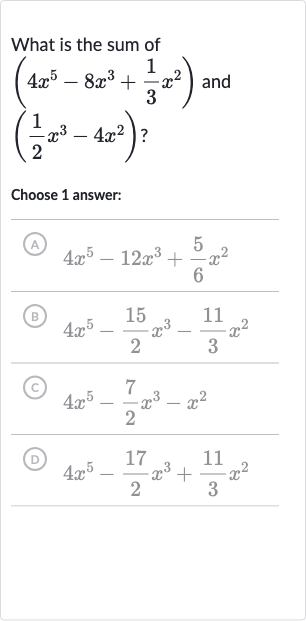Full solution
Q. What is the sum of and Choose answer:(A) (B) (C) (D)
- Write down polynomials: Write down the given polynomials and prepare to combine like terms.We have:First polynomial: Second polynomial: To find the sum, we will add the coefficients of the like terms.
- Combine terms: Combine the coefficients of the terms.Since there is only one term in the first polynomial and none in the second, the term in the sum is .
- Combine terms: Combine the coefficients of the terms.The first polynomial has and the second polynomial has . Adding these gives us .
- Combine terms: Combine the coefficients of the terms.The first polynomial has and the second polynomial has . Adding these gives us .
- Write down final sum: Write down the final sum of the polynomials.Combining the results from the previous steps, we get:However, we need to express as a fraction to match the answer choices. is the same as , so the term becomes .
- Match with answer choices: Match the final expression with the given answer choices.The final expression is , which corresponds to answer choice (B).
More problems from Compare linear, exponential, and quadratic growth
QuestionGet tutor help
QuestionGet tutor help
QuestionGet tutor help
QuestionGet tutor help
QuestionGet tutor help
QuestionGet tutor help
QuestionGet tutor help

